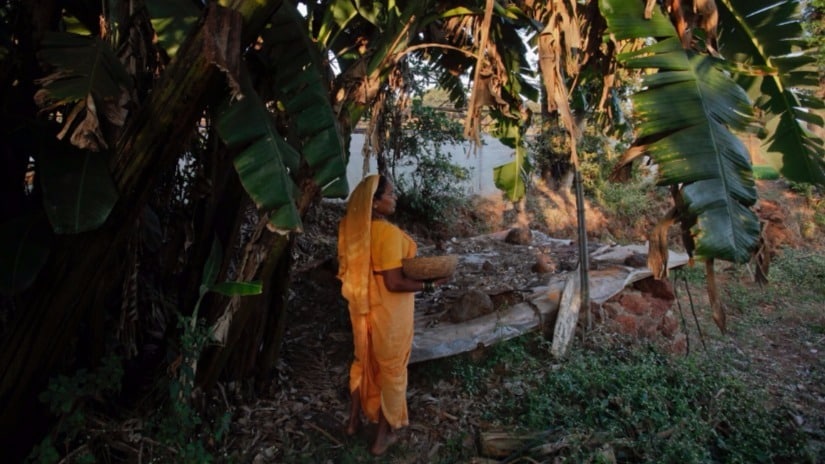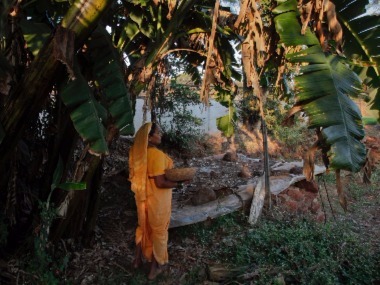By Sharanya Gopinathan A few years ago, I heard terrible noises outside my bedroom window and looked out to see a group of neighbours huddled around a dead body. A resident had stabbed his wife 49 times with a kitchen knife during an argument before leaping to his own death outside my window. A police officer told Hindustan Times that one of the reasons for the murderer’s rage was that his wife made twice as much money as he did. There are other dark stories of Indian techies (working in companies like Dell, Infosys and Siemens) murdering their wives, all appearing in some part unable to deal with the mental and emotional wounds caused by their wives working or earning more than them. I was thinking about this depressing story, and the varying horrors and obstacles women face in earning money and owning property, when chatting with Varsha Deshpande, an advocate and founder of the Dalit Mahila Vikas Mandal (DMVM), a women’s collective working in Satara, Maharashtra. The Times of India recently published an article on a new development in Satara with the adorable headline: “Now, nameplates in Satara have both Mr and Mrs.” The story was about how 5,000 women in 20 villages now co-own the home they live in, while another 500 are in the process of co-owning family farmland too. As the TOI report says, this is significant in a country where 75 per cent of women practice agricultural work, but only 12.78 per cent are listed as owners of their land. [caption id=“attachment_4216351” align=“alignnone” width=“825”]  In Satara, 5,000 women in 20 villages now co-own the home they live in, while another 500 are in the process of co-owning family farmland too. REUTERS[/caption] For the past three years, the DMVM has been pushing for women in primarily agrarian Satara to be named in the title deeds of the homes and properties they live on. Deshpande says her organisation came to the conclusion that property ownership would be a particular boon to women for several reasons. She told The Ladies Finger, “We were already working with abandoned women, campaigning against domestic violence and for alcohol prohibition. We realised that one of the ways in which women could change their status in both family and society was if they had the confidence of knowing they have property in their name. Property ownership is a key tool in fighting violence against women. It changes the dynamics within the house, and she’s able to stand up to her husband and in-laws with that knowledge. That’s why we were pushing for the implementation of the law.” The law she’s referring to is the Ghar Doghanche (Home for Two) resolution passed by the Maharashtra rural development department in 2003, which advocated the right of women to their husband’s property. And that the marital home should be owned by both the husband and wife (intriguingly, this resolution is only in place for rural areas in Maharashtra, not urban or semi-urban areas). She says some families in Satara were actually surprisingly receptive to the idea of women being listed as home and landowners. “Every household in Satara has one person working away in Mumbai, or one person working in the army. For these fauji families, they were worried about what would happen to their wives if something were to happen to them while on duty. Another reason which convinced people, I found it quite funny, was they would say, ‘She’ll anyway get the property when I die, so if she feels more included and gets the property in my own lifetime, she’ll probably want to serve me better.’ I never thought [property ownership] would become a way to serve men better, but there you have it,” she laughs. The DMVM did, naturally, face stiff opposition too. She said the gram panchayat was afraid the DMVM would get the (due) credit for implementing the state’s directions. “They even told people not to join us and discouraged them from attending our meetings.” Other residents of the area, like 74-year-old Sriranga Jadhav of Bhivadi village, say that handing over land to women will only cause trouble, and believe that land rights should be governed by parampara or tradition. Until very recently, in keeping with “tradition,” Hindu women couldn’t inherit agricultural land (or be listed as heirs of joint family property, or claim the right to live in or seek partition of the family house), until a 2005 amendment to the Hindu Succession Act, which said sons and daughters had equal rights to inheriting land and family property. Meaning women could now legally inherit it, if they were aware of these rights and in a position to claim to them. This report on a 2013 study says that only one in 10 Indian women inherit land and, intriguingly, that “the majority of women said that they did not want to inherit land because of the opposition they would face within their families.” We know it isn’t just the women of Satara who face an uphill task when it comes to accessing and owning property, and it isn’t just the yoke of tradition that short-changes Indian women. While Indian men are at varying times huge proponents of both tradition and progress, in both these hallowed zones, property ownership favours men and women continue to get the short end of the stick. Let me give you an example less drastic than my murderous neighbour. Amongst your urbane, poolside-brunching “modern” friends, when have you ever seen a two-vehicle household where the woman drove the larger car? Or a household with a single two-wheeler where the vehicle was registered in the woman’s name? And why not? Because just. Let’s look at other instances. More often than not, in a household with two working adults, who would you guess had health insurance, the man or the woman? The modern forms of property ownership, of houses, cars, stocks, bonds, investment portfolios, are still understood to be male, or registered under the name of a man, even if they’re intended for the entire family or, reasonably, the adults. These forms of economic security may be modern, but the sexism that governs their ownership is as old as this land we walk on. Still, when I think about my old neighbour, who was so incensed by his wife’s salary (among other things) that he hacked her to death, I can’t shake the eerie feeling that he wouldn’t have had it the other way round either. He’s part of a generation of modern Indian men who believe they want, and certainly expect, working wives, wives who can contribute to the household’s finances and have interesting things to say when asked about work at social gatherings, but only until it’s fun for them. The conundrum is reflected perfectly in the modern-day matrimonial ad: a call for women who are educated but not too educated, interested in working but not long hours that keep you away from home, and certainly not the kind that makes you more money than your husband, a wife who will drive the children to tennis lessons but not in the bigger car. The kind of explosive anger we see when the balance between tradition and modernity is upset shows you just how much is at stake. Whether we’re techies in Bengaluru or the Gram Sabha of Satara, there’s still a bloody and ancient parampara guarding the way we understand what it means to be modern today. And it’s going to take active interventions by women and women’s groups, like the DMVM, to have it any other way. The Ladies Finger (TLF) is a leading online women’s magazine
The Dalit Mahila Vikas Mandal has been pushing for women in primarily agrarian Satara to be named in the title deeds of the homes and properties they live on
Advertisement
End of Article


)
)
)
)
)
)
)
)
)



